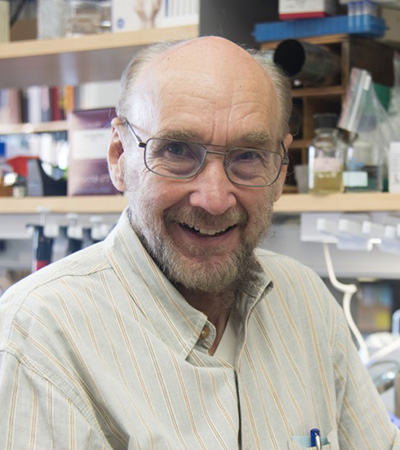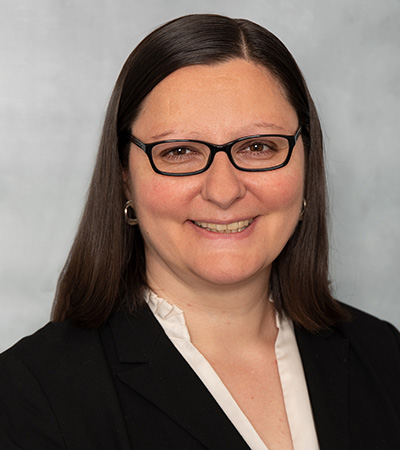Honors for Shan, Landick and Bankston
Shan wins NAS award

Shu-ou Shan has been awarded the National Academy of Sciences Award in Molecular Biology. This award recognizes a recent notable discovery by a young citizen scientist, honoring Shan for her research elucidating how newly synthesized proteins are transported to cell membranes and advancing the understanding of molecular mechanisms in complex biological pathways. The NAS honored 20 individuals this year with awards for their scientific achievements in fields including the physical, biological, social and medical sciences.
Shan is an endowed professor of chemistry and the executive officer for biochemistry and molecular biophysics at the California Institute of Technology. Her lab integrates mechanistic enzymology and biophysical tools to decipher the molecular basis of diverse protein biogenesis pathways. She has uncovered a series of checkpoints, filters and proofreading mechanisms that impart fidelity to nascent protein triage on the ribosome and molecular chaperone–mediated protein folding. Shan received the American Society for Biochemistry and Molecular Biology Young Investigator Award in 2013, and she has served as an associate editor for the Journal of Biological Chemistry.
“It is humbling to be in the company of this outstanding group of scientists," Shan said in a press release. "I am grateful to my mentors throughout my career as well as my colleagues at Caltech who supported me all these years. Most importantly, I want to thank all the students, postdocs and scientists who actually did the work to drive the science forward. The award belongs as much to them as it does to me."
Shan received a medal and a $25,000 prize at NAS’s 161st annual meeting in April.
Landick receives faculty award

The University of Wisconsin–Madison has honored Robert Landick with the Hilldale Award, which recognizes faculty members from the arts and humanities, biological sciences, physical sciences and social sciences for their contributions to teaching, research and service. Awardees receive an honorarium and are recognized at a faculty senate meeting.
Landick is a professor of biochemistry at UW–Madison. His work focuses on the biochemical processes behind the form and function of DNA and RNA, and he has made pivotal discoveries on RNA polymerase and the mechanisms that enable and regulate DNA transcription and RNA translation.
Landick is a member of the American Academy of Arts and Sciences and the American Association for the Advancement of Science and a fellow of the American Academy of Microbiology. He was the founding director of the Microbiology Doctoral Training Program at UW–Madison. In addition, he helped launch the Great Lakes Bioenergy Research Center, a keystone national research hub working to enable sustainable energy independence, and helped establish UW–Madison as an international center for cryogenic electron microscopy.
“Landick has made a continuing stream of seminal research contributions that place him among the most elite faculty on campus,” Brian Fox, professor of fermentation biochemistry and biochemistry chair, said in a release. “His exceptional vision and leadership have strengthened our campus immeasurably. We view Landick’s service as a treasured asset of the University and the State of Wisconsin.”
Bankston chosen for policy fellowship

Adriana Bankston has been named a Congressional Policy Fellow by the American Society of Gene & Cell Therapy. Beginning in fall 2024, she will spend a year on Capitol Hill providing science-based, independent guidance to federal policymakers. This fellowship is offered in partnership with the American Association for the Advancement of Science’s science and technology policy fellowships program.
Bankston is a policy advisor for the Universities Research Association’s Science Policy and Advocacy for Research Competition program. She is also a biomedical workforce and policy research investigator at the Sai Resident Collective, a community of scientists, artists, engineers, teachers and entrepreneurs that builds science education, engagement and communication resources.
Bankston received the 2022 Emerging Broader Impacts Leader Award from Advancing Research Impact in Society and an advocacy award from the Advocacy Association. She has published in outlets such as Inside Higher Ed, and she is an ASBMB Today contributor.
“I'm honored to be selected as the inaugural 2024–2025 ASGCT Congressional Policy Fellow,” Bankston said. “This fellowship provides a fantastic opportunity for scientists to apply our technical knowledge to federal policymaking on Capitol Hill and to gain direct experience into our nation's legislative process. I look forward to bringing my scientific expertise to the U.S. Congress and contributing to our nation's advancement in science and technology through this fellowship.”
Enjoy reading ASBMB Today?
Become a member to receive the print edition four times a year and the digital edition monthly.
Learn moreGet the latest from ASBMB Today
Enter your email address, and we’ll send you a weekly email with recent articles, interviews and more.
Latest in People
People highlights or most popular articles

The data that did not fit
Brent Stockwell’s perseverance and work on the small molecule erastin led to the identification of ferroptosis, a regulated form of cell death with implications for cancer, neurodegeneration and infection.

Building a career in nutrition across continents
Driven by past women in science, Kazi Sarjana Safain left Bangladesh and pursued a scientific career in the U.S.

Kiessling wins glycobiology award
She was honored by the Society for Glycobiology for her work on protein–glycan interactions.

2026 ASBMB election results
Meet the new Council members and Nominating Committee member.

Simcox wins SACNAS mentorship award
She was recognized for her sustained excellence in mentorship and was honored at SACNAS’ 2025 National Conference.

From humble beginnings to unlocking lysosomal secrets
Monther Abu–Remaileh will receive the ASBMB’s 2026 Walter A. Shaw Young Investigator Award in Lipid Research at the ASBMB Annual Meeting, March 7-10 in Washington, D.C.
